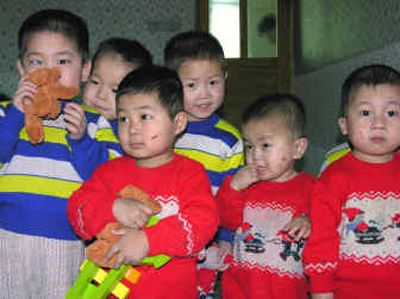Food agency can’t supply N. Korea’s kids, elderly

BEIJING – The U.N. World Food Program is launching a new appeal for food donations for North Korea, an agency official said Saturday, warning that dwindling supplies are forcing it to cut off aid to children and the elderly in the isolated country.
The warning comes amid pressure on North Korea to return to six-nation talks on its nuclear program, though Washington and other participants say they will not let the tensions affect their donations.
The communist North’s creation of private markets has done little to help ordinary North Koreans feed themselves because prices have risen beyond the reach of most families, said WFP’s Asia director, Anthony Banbury.
WFP has received supplies in recent months that let it feed 6.5 million North Koreans, but those are running out, Banbury said at a news conference after returning from a trip to the North.
“As good as things have been these last few months, they’re about to get much, much worse,” he said. “Unless we get new contributions in the next weeks, we’re going to face serious cuts.”
WFP already has stopped giving vegetable oil to 900,000 elderly North Koreans and will cut back supplies to schoolchildren next week, Banbury said. The oil is a source of nutrition for people whose only other food might be corn porridge and acorns.
The North has relied on foreign aid to feed its 24 million people since disclosing in the mid-1990s that its state farm system had collapsed after decades of mismanagement and the loss of subsidies from Moscow.
In January, WFP asked governments for 500,000 tons of food for North Korea this year.
The appeal comes amid competing aid demands for areas hit by the Dec. 26 Asian tsunami and is overshadowed by tensions over the North’s nuclear ambitions.
WFP plans in coming weeks to ask donors for more food and will appeal for the first time to South Korean companies, which give to other charity efforts for the North, Banbury said.
The North’s government also has been forced to cut supplies given out at its own food distribution centers, Banbury said. He said daily rations there have fallen from 10 1/2 ounces of grain – already considered less than necessary for survival – to 8 3/4 ounces.
In Huichon County, north of the capital, WFP temporarily cut off food supplies late last year after North Korean officials stopped letting the agency visit to monitor who received the aid, Banbury said.
Monitoring is a key concern of the United States and other donors, who worry that aid might be diverted to the North’s military or supporters of the ruling party.
Banbury said he did not know why WFP officials were barred from the county. But he said it happened after North Korean officials expressed unease at the agency’s hundreds of visits to private homes to question families about their incomes, food needs and other information.
People in the county “were not able to make up the difference (in food supplies) at all and they suffered as a result,” Banbury said.
After North Korean officials agreed to resume monitors’ access, the head of the local government “was literally ecstatic that the food aid was going to be returning,” he said.
Private markets allowed as part of experimental economic reforms have had only mixed success, helping a small group of North Koreans who can afford high prices, Banbury said.
With salaries at many state companies equivalent to $1.30 per month, a bottle of vegetable oil at one of the markets can cost up to two months’ pay, he said. WFP says the markets’ rice and corn prices rose by 300 percent last year.
“For people who are relying on the traditional income sources – their salaries – they’re clearly in a worse position,” Banbury said.